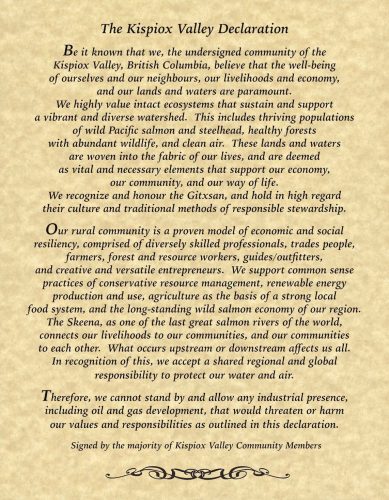Calgary-based TC Energy has been hired to work on revised designs for the planned Prince Rupert Gas Transmission (PRGT) pipeline. Residents in the Kispiox Valley are concerned about the wildlife, marine life and way of life in the valley if this project is approved.
Graeme Pole is a photographer and writer who lives in Kispiox who gave a presentation about the effects of this pipeline on Monday November 21st in Kispiox. He spoke to CICK News.
The PRGT route is intended to stretch nearly 900 kilometres from northeast B.C. to a site at Wil Milit on Pearse Island on the West Coast to supply natural gas to Asia.
Originally owned by Enbridge, the Westcoast Connector and PRGT initially received their environmental assessment certificates in 2014, which expire November 2024.
In March of 2023, the B.C. government introduced new environmental standards for Liquified Natural Gas (LNG) projects in a bid to spur net-zero emissions of greenhouse gases by 2030. This 10-year old proposal, purchased by TC Energy, has not been assessed under new standards.
The project is called Ksi Lisims, and the three partners are Western LNG, LNG Rockies and the Nisga’a Nation. Ksi Lisims plans to use two floating facilities to produce LNG. If successful, the project will deploy other vessels to ship LNG to Asia, starting exports by early 2028, significantly increasing tanker traffic in the port of Prince Rupert.
Along the nearly 900 kilometres of pipeline, there will be 8 compressor stations, one of them 14 kilometres north of Kispiox. The effects of air, water, light and noise pollution that will come along with a compressor station threaten the health and wellbeing of all in the valley (with a lifespan of lasting up to 40 years), according to critics of the project.
The Kispiox Valley Community Center Association wrote a letter of declaration in 2016 declaring their commitment to clean waters and air (shown below).

The majority of the members of the Kispiox Valley say "no" to fossil fuel industry. Courtesy of Graeme Pole.


